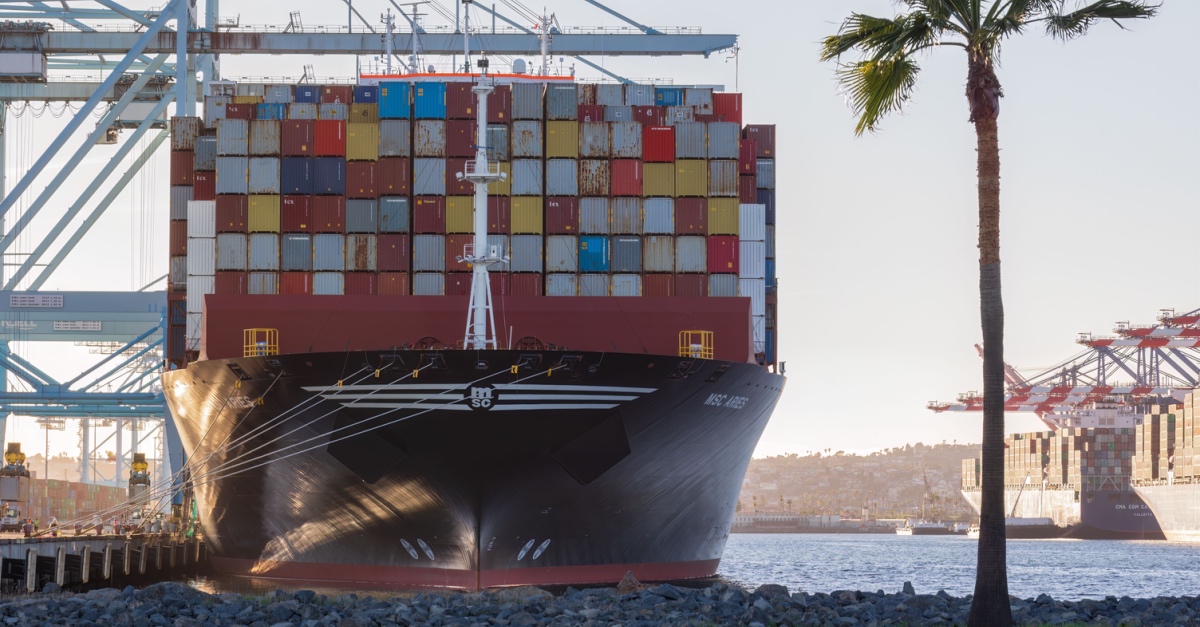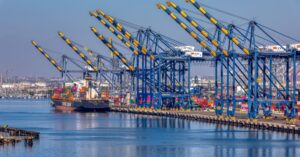The April 13 seizure of the MSC Aries by Iranian forces marked an extraordinary escalation of tensions in the Red Sea, after months of aggression from Houthi rebels against cargo vessels.
The ongoing disruptions have led not only to diversions around the troubled waters, but above them as well. Air freight volume is up, capacity is down, and rates of course have risen, with projections of a larger squeeze come peak season. Here’s more on the news that matters in logistics and transportation.
Iranian Seizure of MSC Aries A New Wrinkle In Red Sea Conflict
The situation in the Red Sea worsened when the British-owned, Portuguese-flagged MSC Aries was taken over by members of Iran’s Revolutionary Guard. This was the first time Iran had committed an act of piracy in the waterway since Houthis began terrorizing vessels in November.
Oil tankers make up the bulk of the 34,000 vessels using the Strait of Hormuz annually, representing 62% of transits, followed by dry bulk (17%), container ships (15%), general cargo (4.3%), and roll on/roll off (1.8%). The number of commercial vessel sailings through the strait fell 45% in the first quarter, according to the International Monetary Fund.
Ocean Freight Disruptions, E-Commerce Fueling Air Cargo Demand
E-commerce demand is expected to remain strong, driving increased air freight demand ahead of the 2024 peak season along with ocean freight disruptions, freight forwarders told the Journal of Commerce (subscription required).
This is tightening air capacity and impacting rates, with charter filling in gaps in global logistics demand. Chinese fast-fashion giants Shein and Temu are major contributors. One forwarder told JOC that the two combined shipped 6,000 tons of air cargo a week during the 2023 peak season.
This means peak season air capacity will likely be tighter than in 2023, forwarders said. A report from freight rate analytics platform firm Xenta found air freight rates were up 11% in March, for the third consecutive month.
XPO Opens Three New Terminals Acquired From Yellow Freight
Leading logistics firm XPO has opened three of the 28 terminals it acquired in December out of bankruptcy from Yellow Freight, the company announced. The terminals are in Goodlettsville, Tenn., near Nashville, Grand Junction, Colo., and Nogales, Ariz., south of Tucson.
With the acquisition, XPO now has 297 service centers nationwide. XPO said the three new terminals, near major population centers and interstate highways, helps reduce shipping times. Its larger footprint supports coast-to-coast linehaul capabilities, and adds operational flexibility. XPO put in a winning bid of $890 million for the three facilities.
Truckers, Farmers Protest California Emissions Mandate
A coalition of farmers and truckers warned that a recent California court decision allowing that state to set its own zero-emission standards would be catastrophic for supply chains, forcing many smaller carriers out of business.
“Obviously, this thing is going to cost untold millions, billions of dollars that we have no way that we’re going to pay for,” independent Ohio trucker Monte Wiederhold said on Fox & Friends First.
The California Air Resources Board (CARB) Advanced Clean Trucks (ACT) rule requires manufacturers to make zero-emission vehicles (ZEV) an increasing percentage of their sales in California between 2024 and 2035. At that point, ZEVs would have to represent 55% of Class 2b-3 truck sales, 75% of Class 4-8 straight truck sales, and 40% of truck-tractor sales. The related Advanced Clean Fleets (ACF) rule calls for fleet operators to only purchase ZEVs by 2036.
However, California needed a waiver from the EPA to impose air quality standards that were higher than federal ones. An appellate court in Washington, DC upheld the EPA waiver earlier this month, negating 17 lawsuits from attorneys general.
Truckers, Safety Advocates Oppose FMCSA Proposal to Ease CDL Requirements
A proposal from the Federal Motor Carrier Safety Administration (FMCSA) to relax requirements for new drivers to obtain their CDL and help ensure adequate trucking capacity, is facing pushback from owner-operators and safety advocates.
The proposed rule change would allow CLP holders who have passed the CDL skills test to operate a truck without a CDL holder in the passenger seat. It would also allow CDL applicants to take the skills test in a state other than the one where they live. Lastly, applicants would no longer have to wait 14 days after being issued a CLP before taking the CDL skills test.
The American Trucking Associations (ATA) is advocating for the changes in order to address a driver shortfall. “If the industry and broader supply chain doesn’t effectively address the driver shortage, it could reach 160,000 drivers by 2030,” said ATA safety policy director Brenna Lyles, in comments submitted on the proposed rule.
Todd Spencer, president and CEO of the Owner-Operator Independent Drivers Association, said in comments on the rule change that the FMCSA “fails to explain how the CLP holder will be adequately mentored” if a CDL holder isn’t riding shotgun.
In A Disruptive Environment, Seek Out Strong Partners
With no end in sight to ocean cargo disruptions as tensions rise in and around the Red Sea, leading to tighter capacity and higher costs of air freight, shippers need to build greater flexibility and adaptability into their booking and budgeting. Having a logistics partner well-versed in all aspects of land, sea and air transport is certainly a huge plus at a time like this.
COGISTICS Transportation is that trusted partner that can help you successfully chart a course through rocky shoals. With more than 30 years of experience in ocean freight logistics, COGISTICS Transportation is licensed as an Ocean Transportation Intermediary (OTI) and a Non-Vessel-Operating Common Carrier (NVOCC) by the Federal Maritime Commission (FMC).
Our collaborative communication means 24/7 access to a team of experts who work collaboratively with shippers to address challenges before they arise. With reliable logistics services across ocean freight operations, land, and air, our multimodal approach covers LTL, TL, and expedited freight. Get in touch today to learn more.




